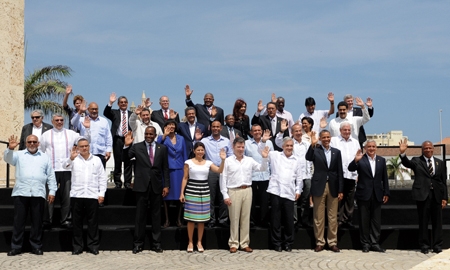
President Juan Manuel Santos is proving to be a breath of fresh air for Colombian politics. It is widely believed that the shifts in foreign relation policies implemented by the country’s leader will have positive impacts on regional security and strengthen cooperation across the South and North American continents.
Neighboring countries are welcoming the President’s initiative to broaden Colombian friendships. Proof of this was reflected shortly after he took office in 2010, with Ecuador resuming full diplomatic ties and a declared truce with Venezuela, after the latter had been accused of collaborating with the Revolutionary Armed Forces of Colombia, or FARC.
Regional powerhouse, Brazil, has particularly embraced the President’s resolution to counter narcotics. Brazilian assistance on this front is a move that would undoubtedly be well received in Washington, and one that could further strengthen ties between the two nations.
Colombia-U.S. Relations
Colombia and the United States have maintained excellent bilateral relations for many years, with strong cooperation and high trade levels. The recently signed free trade agreement (FTA) is expected to further strengthen the relationship.
Since 2000, Colombia has received American aid to combat guerilla and drug-related issues. While other countries in the region have shown the cold shoulder to U.S. drug interdiction efforts, Colombia has embraced them.
During the previous Uribe administration, more than 900 criminals were extradited to the U.S., including Cali cartel leader Gilberto Rodriguez Orejuela and the FARC’s Juvenal Ovidio Palmera Pineda and Omaira Rojas Cabrera. In 2008 alone, 208 people were surrendered to the U.S.
Moreover, the U.S. is Colombia’s largest trading partner, with exports in 2011 representing nearly 40% of Colombia’s exports and a quarter of its imports. Oil constitutes two-thirds of these exports, followed by coffee and other food produce.
Close cooperation continues under the Santos administration with U.S. policy supporting the government’s initiatives to promote security, strengthen respect for human rights, foster socioeconomic development, and deal with threats to democracy.
The relationship between the two countries is comparable to other strategic American alliances, such as with the United Kingdom.
FTA and other pacts
The strong relationship established between Colombia’s former President Uribe and the Bush administration was reinforced by numerous official visits between both countries. Mr. Uribe travelled to the U.S. on numerous occasions, and Mr. Bush visited Colombia in 2007.
In 2008, former U.S. Secretary of State Condoleezza Rice was in Colombia to support lobbying efforts of the FTA, which had been signed and submitted to Congress by former President Bush in 2006.
Now, finally ratified, experts believe that the FTA will further unite the two countries and enhance transparency in businesses. Colombia also enjoys FTAs with Canada and Mexico, among others.
Colombia and the U.S. have also joined forces in agreements on asset sharing, chemical control, and environmental protection, including an understanding on clean energy signed in 2008 and a Science and Technology Agreement endorsed in 2010.
U.S. assistance is also felt in Colombia’s alternative agricultural actions. Over the past decade, more than 400,000 families in 18 Colombian departments have benefited from the implementation of such programs that promote a shift from the cultivation of illegal crops to legal alternatives.
Other humanitarian collaboration includes a multi-year country assistance agreement, signed in 2009, which combines American efforts in this area with those of Colombia’s public and private sectors.
1 COMMENT
Es importante que haya buenas relaciones entre Colombia y Venezuela a pesar de las distancias ideológicas. Somos todos hermanos